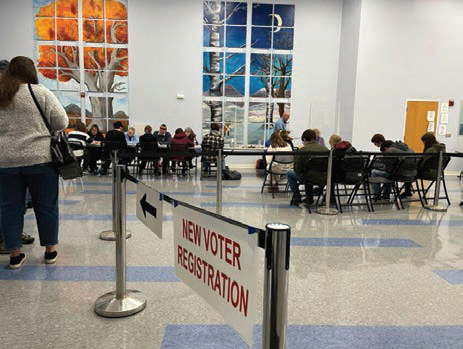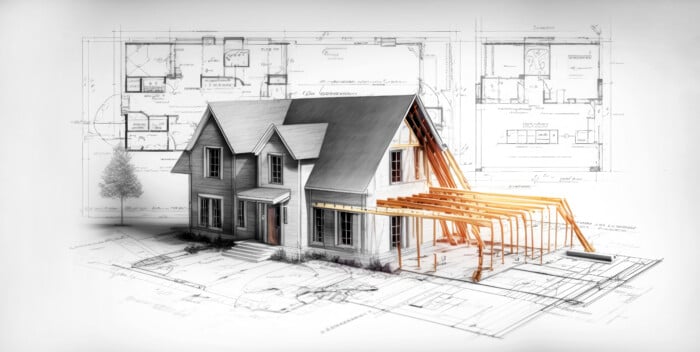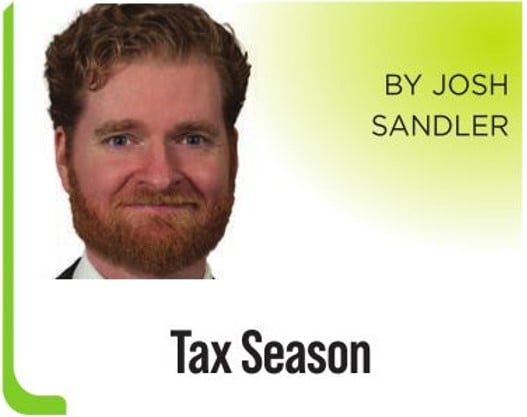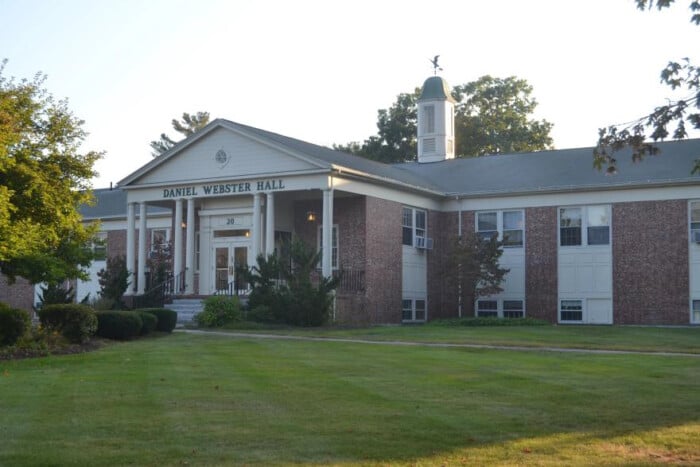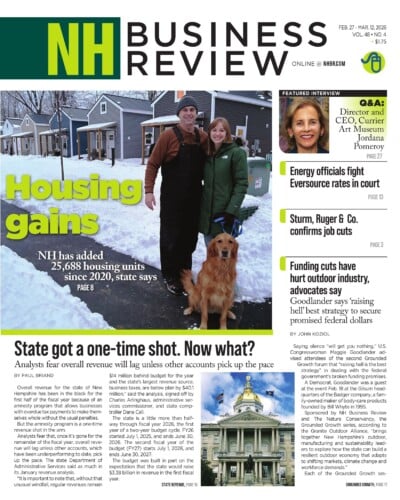New Hampshire voters aren’t feeling much relief from their anxieties about the state’s housing crisis, according to a new study.

During a panel discussion at NH Housing’s annual conference on housing and the economy Oct. 16, Somersworth Mayor Matt Gerding, far right, took issue with housing program cuts in the new state budget. With Gerding on a discussion about how communities are tackling the housing crisis were, from left, panel moderator Sarah Wrightsman, New Hampshire Housing; Bart McDonough, director of planning and community development, town of Newmarket; Pam Laflamme, director of strategic initiatives and assistant city manager, city of Berlin; Mari Brunner, senior planner, city of Keene; and Gerding. (Photo by Paul Briand)
Meanwhile, a new report says the continued reduced housing inventory, one of the causes of that voter agita, pushes home prices higher, “dampening labor market dynamism” in the Granite State.
The survey and report served as backdrops to the 2025 New Hampshire Housing and Economy annual conference held Oct. 16 at the Grappone Conference Center in Concord.
The survey comes from the Saint Anselm College Initiative for Housing and Policy Practice and shows “a consistent pattern of pro-housing sentiment across regions, age groups, and political affiliations. Housing has indeed become a unifying policy concern for the New Hampshire electorate,” said Elissa Margolin, the Initiative’s executive director.
The report comes from New Hampshire Housing, released as part of the conference that drew more than 200 people.
Addressing the crowd, Gov. Kelly Ayotte, saying that housing is the “most important economic issue in our state” pointed to her executive order that streamlines the state permitting process for certain housing developments. And she cited laws she signed from the 2025 legislative session that help address supply and zoning constraints on the local level.
“I’m here to advocate for you, because I know as governor that if we get this housing issue fixed, that it’s only an upward trajectory for the state of New Hampshire,” Ayotte said.
Outwardly, Rob Dapice, the executive director/CEO of NH Housing, did not criticize the governor but thanked her for her efforts to lower zoning barriers. But one of the slides in his opening presentation noted that the governor’s and Legislature’s budget for fiscal 2026 vastly reduced the amount of state funds for housing initiatives.
According to the data, the FY26 budget has 70% less for housing than previous two budgets, a reduction from $35 million to $10 million. “Future investments will be critical,” it said.
Somerworth’s mayor, Matt Gerding, was more forthcoming, however, about the housing cuts.
“I would not tell my fire department: Oh, sorry, we’re not going to fund you, even though there’s a forest fire over there. I’m not going to do that as a mayor. I’m shocked that the state of New Hampshire did that in the middle of the housing crisis. It just blows me away,” Gerdling said to loud applause.

Gov. Kelly Ayotte addressed the annual New Hampshire Housing and Economy conference Oct. 16, telling the crowd of the strides the state has made toward easing its housing supply issue. (Photo by Paul Briand)
By the time of Gerding’s presentation — as part of a panel exploring how local communities are tackling the housing crisis — the governor had left for a ribbon cutting in Portsmouth.
There were other messages sprinkled through the conference for the state’s political leaders.
“We see housing as another form of infrastructure. Just like roads and bridges connect people to places, housing connects people to opportunity, to financial stability. It allows them to move their lives forward,” said Jeff Lefkovich, executive director of real estate and housing development at Catholic Charities New Hampshire.
“So what we’re trying to say to our legislators is: Consider housing as infrastructure. In our view, housing is where stability begins, and that’s our focus,” added Lefkovich, who made his comments as part of a panel that discussed housing challenges.
The survey that came out of St. A’s housing initiative showed that 64% of respondents say state lawmakers should include public investments in the next state budget to build more affordable housing. Voters aged 65 and older registered the strongest support, with 70% in favor of public funding, according to the survey.
It showed 78% of survey respondents agreed with the statement “My community needs more affordable housing to be built.” Another 61% of Granite Staters think that towns and cities should change land use regulations in order to allow more housing to be built.
“Voters are not only feeling the adverse impacts of the limited housing supply, but they are also expressing support for specific tools to address affordability, including smaller-lot single-family zoning and the adaptive reuse of existing homes,” said Margolin upon release of the survey Oct. 15.
The NH Housing report was notable in its detail of how the supply and affordability issues in the rental market are affecting the very jobs that Granite Staters depend upon — nurses, police officers, electricians, carpenters, and childcare workers to name a few.
The report says many of these workers earn wages well below what is needed to afford median rents in the state.

Rob Dapice, the executive director/CEO of NH Housing, welcomes a large crowd to the organization’s annual conference on housing and the economy Oct. 16. (Photo by Paul Briand)
A police officer, for example, earns on average $1,663, according to the report. But the median rent for a two bedroom apartment in the state is $2,024, while a one-bedroom unit goes for $1,668 a month.
In a section with the description of “Real Reality,” the report said Berlin is the most affordable of the state’s 13 cities for most occupations to live in. It said workers there would need an hourly wage of $20.25 to live there.
On the other hand, the two most expensive cities are Lebanon at number one (where an hourly wage of $46.42 is needed to afford a median rent there), and Portsmouth was number two at $45.52 an hour needed to afford a median rent there.
In terms of the residential housing market, the report noted that someone would have to earn $88 as a full-time hourly wage to afford to purchase a median priced house in the state.
The report used as its median the record high $565,000 calculated by the New Hampshire Association of Realtors (NHAR) in June. (It has since moderated a bit to $532,000 in September.)
According to the report, only an estimated 15% of all New Hampshire households can afford a house at that record-high price.
The conference keynote speaker, Kyla Scanlon, offered a presentation on the economy writ large, citing factors that point to uncertainty. Scanlon is a writer and educator who coined the phrase “vibecession” to describe a disconnect between data that points to a stronger economy but public unease about the economy.
Normally, an economy has risks, according to Scanlon.

Kyla Scanlon was the keynote speaker at the Oct. 16 NH Housing annual conference on housing and the economy. Scanlon spoke about “vibecession,” a phrase she uses to describe that people’s unease about the economy are at odds about what the data says about the economy. (Photo by Paul Briand)
“Risk is like rolling the dice; it’s pretty measurable. You know the possible outcomes. You can assign probabilities to each one. There’s six sides. It’s pretty straightforward,” she said.
With uncertainty, however, it’s “more like walking into a casino where you don’t even know the game that you’re going to play. It’s really hard to measure uncertainty, and that’s actually one of the big headaches that we have with the economy right now,” she said.
She asked: Is an economic bubble about to burst? She talked extensively about artificial intelligence (AI) and the massive investments being made in the software, products and data centers.
“This is something that’s really taking over the economy. It’s 75% of all S&P 500 earnings growth, so it’s taken over the stock market in a very big way, and it’s going to impact how we all interact and move through the world, and it likely will impact housing at some point too,” she said.
Click the link to view some of the materials and presentations from the New Hampshire Housing conference.




